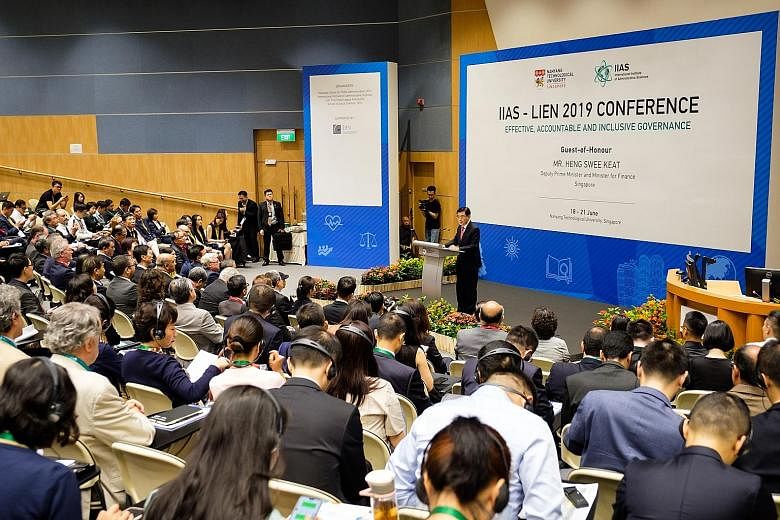One of the key principles of governance in Singapore is to enable people to fulfil their potential regardless of their backgrounds and where they started in life, Deputy Prime Minister Heng Swee Keat said yesterday.
This means investing in early childhood education, providing multiple pathways to success and helping citizens embrace lifelong learning so they can take on new jobs and keep up with technological advancements, he said in a keynote address at an international conference in Singapore on governance.
The Government also works with the community to build a society that provides opportunities. One way is to partner social workers and social service organisations to design and implement policies that help children with specific needs.
Empowering people to fulfil their potential is one of three principles of governance which have worked well for the country, Mr Heng told more than 550 conference participants at the Nanyang Technological University (NTU). The other two are harnessing strength in diversity and planning with future generations in mind, he said.
"Good governance has enabled a small island nation without any natural resources, that depended solely on its people, to succeed," he said, adding that there is still much more to learn from others.
The four-day conference was organised by NTU's Nanyang Centre for Public Administration and the International Institute of Administrative Sciences (IIAS), a Belgium-based non-profit organisation, with funding support from the Lien Foundation.
Mr Heng said good governance is also to draw strength from diversity, through individuals who have different identities based on race, religion, gender, generation, socio-economic status and interests.
But diversity can cause division, he said. In some countries, intolerance and extremism are growing, breeding distrust and violence.
He said: "If we have a common call and draw strength from our differences, diversity can be an advantage. By drawing on diverse ideas and perspectives to explore issues, we experiment with possible solutions and, finding common ground, we can overcome challenges and seize opportunities together."
He noted that Singapore's approach is "to integrate, rather than assimilate, our people". This means no race or culture here is coerced into conforming to other cultures or identities. Instead, over time, each race has retained and evolved its own culture and heritage, while integrating some of the customs and traditions of others, he said.
Singapore also maintains and grows common spaces and shared experiences through initiatives such as the Ethnic Integration Policy, which ensures a balanced mix of ethnic groups living in Housing Board estates, and national service.
Still, it is pressing on with efforts to build common understanding, said Mr Heng, citing, as an example, the Ask Me Anything community-led conversations, where religious leaders address misconceptions about their beliefs and practices.
Mr Heng, who is also Finance Minister, touched on the nature of Singapore's planning for the long term.
He said countries have adopted different approaches, such as raising taxes to fund current expenditures or borrowing to fund recurrent needs and expenditures.
In Singapore's case, the single largest revenue for its Budget is not from any form of taxes, but the Net Investment Returns Contribution. Under the Constitution, the country cannot spend more than 50 per cent of the expected long-term returns from investing its reserves.
While it may seem "less painful" to spend more out of the nation's reserves than to raise taxes, Mr Heng said an over-reliance on reserves would hurt Singapore's ability to respond to changing circumstances in the future, especially given its lack of natural resources.
This is why the Government will raise the goods and services tax from 7 per cent to 9 per cent some time between 2021 and 2025, he noted. "Each generation strives to pay for its own spending through sustainable means, instead of drawing more than is prudent from the reserves or passing on the cost of current spending to future generations," he added.
Summing up, he said good governance is critical to every country's development, especially in a rapidly changing and more complex world. "Good governance is always a work in progress. We must continue to innovate and evolve, and we can do better by learning from one another."
Another speaker at the opening ceremony, Lien Foundation chairman Laurence Lien, said the Fourth Industrial Revolution is bringing about new challenges related to the power and influence of technology, which governments are trying to adapt to. "There is a greater need than ever before for public and non-profit sectors to collaborate... to find new solutions to address gaps and leverage the transformation around us," he noted.


